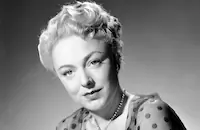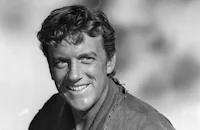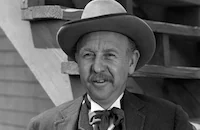The Veils of Bagdad
Brief Synopsis
Cast & Crew
George Sherman
Victor Mature
Mari Blanchard
Virginia Field
Guy Rolfe
Leon Askin
Film Details
Technical Specs

Synopsis
In 1560, Bagdad vizier Kasseim and his wife Rosanna lead a caravan transporting gold and jewels into Bagdad. When they are attacked by a band of thieves, a wanderer named Antar suddenly appears and quickly battles the thieves into submission, winning the admiration of Rosanna and an invitation from Kasseim to join him at the palace. Hours later, however, Antar joins the "thieves" in a forest glen, where they exult over the success of their plan to infiltrate the palace in Bagdad. In reality, they are spies sent by virtuous ruler Suleiman the Magnificent to discover why the pasha of Bagdad, Hammam, has killed the leader of the mountain tribes, Abu Karoum, and begun hoarding gold. Antar travels on to the palace, where Kasseim introduces him to Hammam as his new guard. Hammam accepts Antar, but later warns Kasseim to kill him as soon as his work is done. The two leaders then scheme to entice the new tribal leader, Mustapha, to join them in a plot against Suleiman. Hammam knows that when their ranks grow strong enough, Venice, and then the rest of Europe, will back them in toppling Suleiman. Soon after, Rosanna visits Antar and promises to reveal the whereabouts of the gold if he will spirit her away from Kasseim. Later, in the town marketplace, Antar witnesses Hamman and Kasseim's cruelty when he sees a man being publicly whipped for failing to pay the exorbitant taxes. There, Antar also spots beautiful dancing girl Selima and notices that her dancing style is that of Abu Karoum's tribe. Convinced that she is the slain leader's missing daughter, Antar visits her backstage, where she refuses to reveal her heritage but asks him to bring Kasseim to her. Outside, Antar's band arrives, disguised as a troupe of wrestlers, and perform while he exchanges messages with the wise man who leads them, Kaffar. The next day, Kasseim orders Antar to protect the next caravan, and Antar's success endears him further to the vizier, who agrees to accompany him to see Selima. There, she seduces Kasseim and gains valuable information about her father's death, which she plans to avenge. Meanwhile, Antar, armed with knowledge fed to him from Rosanna, notifies Kaffar that Hammam has bribed Mustapha, and Kaffar offers the tribesman more money. Hammam learns that Mustapha is hesitant and offers him even more. The wise man is caught spying on Hammam as he secures Mustapha's backing, and when Kaffar is discovered, Hammam deduces that he is Suleiman's agent. Hammam tortures Kaffar mercilessly, but the older man refuses to betray Antar. Upon learning from Rosanna that an important prisoner is being held, Antar sneaks into the dungeon and frees Kaffar. He brings him to Selima's, where she and her bodyguard, Karsh, hide him. Knowing that Mustapha will change allegiance for the right amount of money, Antar plans to steal Hammam's gold. That night, he, Kaffar and their men sneak into the palace grounds, not knowing that Selima and Karsh have followed them for their own purposes of revenge. Antar's men easily secure the gold, ensuring that Hammam will lose the support of the Venetians, but as they are about to leave the grounds, Karsh is spotted by the palace guards. Antar orders his band to help, and in the melee, Selima slips into the mansion. The fight progresses to the throne room, where Antar duels with Kasseim, eventually killing him. With Selima's help, Antar roots Hammam out of his hiding place and forces him to abdicate his throne. Antar is named his successor, and both Rosanna and Selima rush to embrace him. Antar soothes Rosanna with a promise of gold and security, and although Selima is at first jealous that he seduced them both, she soon accepts his marriage proposal, to the cheering approval of the palace crowd.

Director
George Sherman
Cast

Victor Mature

Mari Blanchard

Virginia Field

Guy Rolfe
Leon Askin

James Arness
Palmer Lee
Nick Cravat
Ludwig Donath
Howard Petrie

Charles Arnt

Jackie Loughery
Thomas Browne Henry
David Sharpe
Sammy Stein

Bobby Blake

Glenn Strange
Charles Wagenheim
Chester Hayes
Thomas A. Renesto
Hans Schnabel
Vic Holbrook
Russ Saunders Troupe
Bob St. Angelo
Stuart Whitman
Ben Welden
George Lewis
Dale Van Sickel

Merrill Mccormick
Wally Walker
Ed Randolph
Carl Sklover
Emile Avery
Fred Carson
Herman Belmonte
Paul Stathes
Martin Cichy
Jack Perry
Ernest O. Flatt
Jimmy Dime
Al Haskell
Crew
John Austin
Leslie I. Carey
Albert J. Cohen
William R. Cox
Hershel Dougherty
Ralph Faulkner
Fred Frank
William Fritzsche
Russell A. Gausman
Joseph Gershenson
Alexander Golitzen
Marshall Green
Ledger Haddow
Joe Lapis
Phil Lathrop
Eugene Loring
Russell Metty
Emrich Nicholson
Rosemary Odell
Joan St. Oegger
Dewey Starkey
Paul Weatherwax
James Welch
Bud Westmore
Harry Wolfe

Film Details
Technical Specs

Articles
Leon Askin (1907-2005)
Born in Vienna, Austria as Leo Aschkenasy on September 18, 1907, Askin developed a taste for theater through his mother's love of cabaret, and as a youngster, often accompanied his mother to weekend productions.
He made a go of acting as a profession in 1925, when he took drama classes from Hans Thimig, a noted Austrian stage actor at the time. The following year, he made his Vienna stage debut in Rolf Lauckner's "Schrei aus der Strasse."
For the next six year (1927-33), he was a popular stage actor in both Vienna and Berlin before he was prevented to work on the stage by Hitler's SA for being a Jew. He left for Paris in 1935 to escape anti-semetic persecution, but returned to Vienna in 1935, to find work (albeit a much lower profile to escape scrutiny), but after a few years, the writing was on the wall, and he escaped to New York City in 1939, just at the outbreak of World War II. His luck in the Big Apple wasn't really happening, and in 1941, he relocated to Washington D.C. and briefly held the position of managing director of the Civic Theatre, a popular city venue of the day. Unfortunately, after the tragic events of Pearl Harbor in December of that year, the United States became involved in the war that had already engulfed Europe for two years, and seeing a possibility to expediate his application for American citizenship, he enlisted in the U.S. Army.
After the war, Leon indeed became a U.S. citizen and changed his name from Leon Aschkenasy to Leon Askin. He returned to New York and found work as a drama teacher, and more importantly, landed his first gig on Broadway, as director and actor in Goethe's Faust in 1947, which starred Askin in the title character opposite the legendary Albert Bassermann who played Mephisto. The production was a huge success. Askin followed this up with another director/actor stint with Shakespeare's Merchant of Venice and co-starred with Jose Ferrer in Ben Hecht's 20th Century. They were all Broadway hits, and Askin had finally achieved the success he had worked so hard to seek and merit.
It wasn't long before Hollywood came calling, and soon Askin, with his rich German accent and massive physical presence, made a very effective villian in a number of Hollywood films: the Hope-Crosby comedy Road to Bali (1952); Richard Burton's first hit film The Robe; and the Danny Kaye vehicle Knock on Wood (1954).
Askin's roles throughout the 50's were pretty much in this "menacing figure" vein, so little did anyone suspect that around the corner, Billy Wilder would be offering him his most memorable screen role - that of the Russian commissar Peripetschikof who gleefully embraces Amercian Capitalism in the scintillating politcal satire, One, Two, Three (1961). Who can forget this wonderfully exchange between Peripetschikof and Coca Cola executive C.R. MacNamara (James Cagney):
Peripetschikof: I have a great idea to make money. I have a storage full of saurkraut and I'll sell it as Christmas tree tinsil!
MacNamara: You're a cinch!
His performance for Wilder was wonderfully comedic and wholly memorable, and after One, Two, Three the film roles for Askin got noticable better, especially in Lulu and The Testament of Dr. Mabuse (both 1962); but he began to find prominent guest shots on hit television shows too: My Favorite Martian and The Outer Limits to name a few; yet his big break came in 1965, when for six seasons he played General Albert Burkhalter, the Nazi general who was forever taking Col. Kilink's ineptitude to task in Hogan's Heroes (1965-71).
Roles dried up for Askin after the run of Hogan's Heroes, save for the occassional guest spot on television: Diff'rent Strokes, Three's Company, Happy Days; and parts in forgettable comedies: Going Ape! (1981), Airplane II: The Sequel (1982). After years of seclusion, Askin relocated to his birthplace of Vienna in 1994, and he began taking parts in numerous stage productions almost to his death. In 2002, he received the highest national award for an Austrian citizen when he was bestowed with the Austrian Cross of Honor, First Class, for Science and Art. He is survived by his third wife of three years, Anita Wicher.
by Michael T. Toole

Leon Askin (1907-2005)
Quotes
Trivia
Notes
The working title of this film was Prince of Bagdad. A written foreword reads as follows: "In the year 1560 the Ottoman Empire was ruled over by Suleiman the Magnificent. It extended over two-thirds of the civilized world. Fierce hill tribes abounded...and strange alliances were formed. Caravans bearing gold and precious jewels, were often set upon by bandits who rode about the country, seeking their prey...and striking without warning." According to a July 1952 Los Angeles Times article, Maureen O'Hara was considered for the role of "Selima." Universal borrowed Victor Mature from Twentieth Century-Fox for the role. Modern sources claim that, due to a lack in publicity stills, advertisements for the picture featured a shot of Mature's head on top of Tony Curtis' body taken from an earlier film, The Prince Who Was a Thief.














